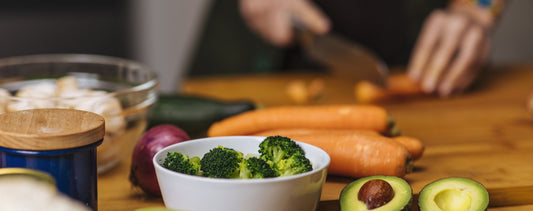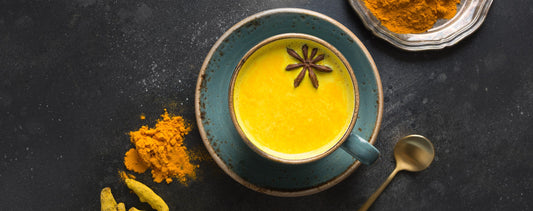Ayurveda, an ancient, holistic practice rooted historically in India, is guided by two main principles:
In fact, living an Ayurvedic or “vedic” life is all about balance and, not surprisingly, vedic cooking follows suit.
Although everyone possesses all three doshas, you have a dominant one that’s the strongest force in your mind and body. If you don’t know your dominant—and secondary—dosha, you can take this quiz to determine your dosha.
Vata reflects elements of space and air. People who are Vata-dominant are commonly quick-thinking, thin, fast-moving, and have sensitive digestion. Pitta mirrors elements of fire and water. Pitta dominants often have fiery personalities, medium builds, powerful intellects, abundant energy, and strong appetites. Kapha echoes elements of water and earth, and Kapha-dominant individuals typically have solid builds, excellent stamina, calm temperaments, and regular digestion.
Knowing your dominant and secondary dosha can help you learn how to balance them through lifestyle practices, such as diet and nutrition. For example, if you’re predominantly Pitta, preparing and eating cooling foods can help balance your fiery nature. On the flip side, warming foods are better for Vatas. And foods that are dry, light, and warm prove to be best for Kaphas.
Listening to your body—observing what makes it feel great and what makes it feel unwell—is paramount, as is working with your health care practitioner to develop the best lifestyle routines for you. If Ayurvedic nutrition sounds like something you’d like to try out and some of the foods are new to your repertoire, introduce them slowly to your meals and see how you feel. Also, take note as to how the cooking style fits into your overall lifestyle. If all’s well, keep at it.
*Editor’s Note: The information in this article is intended for your educational use only; does not necessarily reflect the opinions of the Chopra Center's Mind-Body Medical Group; and is not a substitute for professional medical advice, diagnosis, or treatment. Always seek the advice of your physician or other qualified health providers with any questions you may have regarding a medical condition and before undertaking any diet, supplement, fitness, or other health programs.
Deepak Chopra will guide you through the best wellness practices to nourish body, mind, and spirit in our introductory online course, Discovering Ayurveda. Learn More.
- The mind and the body are connected.
- The mind has the utmost power to heal the body.
In fact, living an Ayurvedic or “vedic” life is all about balance and, not surprisingly, vedic cooking follows suit.
A Handful of Key Aspects
There are a handful of key facets that make up Ayurveda cooking and these are some of the primary ones:Use the freshest ingredients
This means purchasing ingredients that are organic, seasonal, and ideally local, which will ensure you’re cooking with the freshest, most nutrient-dense food you can find. If you don’t have a garden, your nearby farmers market is your next best bet for local food choices. Many major grocery stores also carry local ingredients.Avoid combining ingredients that digest at different speeds
Some ingredients, although they may taste good together, don’t digest well in tandem because they have dissimilar digestion paces. For example, combining fresh fruit with dairy or grains can cause tummy troubles because they digest at different speeds. If you enjoy fruit in your oatmeal, Ayurvedic principles would call for cooking the fruit with the oatmeal so your body can digest them simultaneously. And dairy is a protein that is best eaten alone or with grains.Include all six tastes as much as possible
In Ayurveda, there are six tastes or rasas: astringent, bitter, pungent, salty, sour, and sweet. Vedic cooking recommends incorporating each taste in every meal according to your personal constitution (keep reading to learn more about that) in order to achieve balanced nutrition and good health—and to feel satisfied.Be mindful not to destroy a food’s prana
Prana is a food’s life. In Ayurveda, cooked foods are considered more nourishing than raw foods. However, overcooking, burning, or deep-frying food kills its life-giving nutrients. It can also destroy the taste. Raw foods are harder to digest and can diminish digestive fire or agni. When agni is weak, the body creates toxins or ama that can prevent you from receiving nutrients from food and can cause disease.Cooking according to your dosha
Your dosha is your physical and emotional constitution. Keeping it balanced is key to maintaining or enhancing your health. Read on to learn more about the qualities of doshas and how they play a role in Ayurveda cooking.Dosha Overview
There are three biological energies found throughout your body—Vata, Pitta, and Kapha—and they are derived from the five elements: space, air, fire, water, and earth. In Ayurvedic principles, it’s believed that you can maintain and enhance health by knowing your dosha and then creating a lifestyle that supports it.Although everyone possesses all three doshas, you have a dominant one that’s the strongest force in your mind and body. If you don’t know your dominant—and secondary—dosha, you can take this quiz to determine your dosha.
Vata reflects elements of space and air. People who are Vata-dominant are commonly quick-thinking, thin, fast-moving, and have sensitive digestion. Pitta mirrors elements of fire and water. Pitta dominants often have fiery personalities, medium builds, powerful intellects, abundant energy, and strong appetites. Kapha echoes elements of water and earth, and Kapha-dominant individuals typically have solid builds, excellent stamina, calm temperaments, and regular digestion.
Knowing your dominant and secondary dosha can help you learn how to balance them through lifestyle practices, such as diet and nutrition. For example, if you’re predominantly Pitta, preparing and eating cooling foods can help balance your fiery nature. On the flip side, warming foods are better for Vatas. And foods that are dry, light, and warm prove to be best for Kaphas.
Staple Ingredients in a Vedic Kitchen
If you’re stocking up your pantry, countertop, and fridge to get cooking the Ayurvedic way, these are some of the essentials:- Fresh vegetables and fruits: The key here is a variety of colors—greens, reds, yellows, oranges, and purples. Flavors are also important. Bitter/astringent fruits and veggies, such as spinach, broccoli, asparagus, and chard are lighter and cleansing. Sweet produce—pumpkin, yams, red and yellow peppers, beets, and fennel—is heavier and grounding.
- Herbs and spices: Not only are they a great way to add flavor without adding excess salt, but many of them also have a host of health benefits. For example, turmeric, ginger, and cinnamon—the key spices in Golden Milk recipes—all include anti-inflammatory properties. Basil is known to aid digestion. And black pepper can act as a diuretic.
- Healthy cooking oils: Ghee, which is essentially a form of clarified butter, is revered in Ayurvedic nutrition as a superfood because it promotes healthy digestion, decreases inflammation, can help reduce the risk of cancers and other diseases, and much more. It’s great for high-heat cooking because the lack of milk solids ensures it won’t burn. Coconut oil, which has a smoke point of 350 degrees Fahrenheit, is lauded as being a good fat for sautéing or baking. Coconut oil can raise HDL (good) cholesterol and some research studies say it can help you burn fat. Extra virgin olive oil has anti-inflammatory and antioxidant properties that may reduce the risk of heart disease. However, to retain its healthful properties, it’s best used as a finishing oil rather than a cooking oil.
- Basmati rice and whole grains: In Ayurveda, basmati rice is the king of all kinds of rice because it’s easy to digest and it’s said to balance all three doshas. Barley and quinoa—which are both high in protein, phosphorus, potassium, iron, and magnesium—are also staples in the vedic kitchen.
- Unsalted nuts and seeds: Not only are they a healthier alternative to salty, packaged foods, they’re also rich in protein, healthy fats, and many minerals. They’re delicious in their whole state, but they can also be chopped up and added to dishes, or blended into nut butters. Check out these recipes for eight different kinds of nut butters.
- Herbal teas: Caffeine is astringent. It’s also a stimulant and euphoriant. As such, it provokes all three doshas. For Kaphas, caffeinated beverages like coffee may help stimulate much-needed energy whereas Vatas may feel overly depleted by it. Herbal teas, which are caffeine-free and don’t rev up the doshas, are great for all constitutions. Herb-based teas are often high in polyphenols and studies have shown that they reduce the risk of cancer and heart disease.
Is Vedic Cooking and a Vedic Diet Right for You?
There is no one-size-fits-all way of cooking or nutrition plan for everyone. The best indicator as to whether or not a cooking style and diet are right for you is how your overall health responds. Obviously, if you’re allergic to anything, no matter if it’s touted as a healthy ingredient, don’t cook with it or eat it.Listening to your body—observing what makes it feel great and what makes it feel unwell—is paramount, as is working with your health care practitioner to develop the best lifestyle routines for you. If Ayurvedic nutrition sounds like something you’d like to try out and some of the foods are new to your repertoire, introduce them slowly to your meals and see how you feel. Also, take note as to how the cooking style fits into your overall lifestyle. If all’s well, keep at it.
*Editor’s Note: The information in this article is intended for your educational use only; does not necessarily reflect the opinions of the Chopra Center's Mind-Body Medical Group; and is not a substitute for professional medical advice, diagnosis, or treatment. Always seek the advice of your physician or other qualified health providers with any questions you may have regarding a medical condition and before undertaking any diet, supplement, fitness, or other health programs.
Deepak Chopra will guide you through the best wellness practices to nourish body, mind, and spirit in our introductory online course, Discovering Ayurveda. Learn More.






















